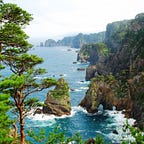Week 1 Discussion Post
2 min readApr 1, 2021
Self-introduction:
- My name is Angela Ouyang and I am a Japanese/International Business major in Revelle College
- I am taking this class because it is a major requirement
- I am excited to learn as much as I possibly can, especially regarding Asian economics and diplomatic relationships between countries, including the incredible economic boom experienced by Japan (during the economic miracle of the 1960's), China in the 1980’s, and Korea as a result of export-oriented industrialization in the late 1960’s.
- I have taken courses with Dr. Matsumura before, and I have to admit I am not a fan of the structure for her classes and I am apprehensive that I will be engaged with both the material and the class in general. I have trouble connecting the questions and readings she presents to us with what I am interested in learning. I think I learn best reading information out of a textbook where the class is much more rigid in structure.
- If I had an unexpected day off I would use it to catch up on work that I’m most definitely behind on, whether that be hobbies, books, or school assignments.
Reading questions for this week:
- As described by Dr. Gilmore, racial capitalism is the process of using capitalism’s inherently unequal power structure to exploit certain races for their labor. This keeps them separated from the means of production and prevents them from reaping in the qualify of life improvements that capitalism delivers to society as a whole. It is the intricate relationship between racism and capitalism that allows both institutions to continue to survive today. As she says “capitalism requires inequality and racism enshrines it.”
- Abolitionist geography refers to place-based liberation struggles, which are unique to particular communities and where they are. The example Dr. Gilmore gives is the municipality of Amadora, where the residents struggle to maintain their homes, despite changing building codes and government regulation. This issue is location-specific to the place and people of Amadora and as a result sparked interest not just their own liberation and rights, but also in the greater narrative of colonialism and racism as a whole.
